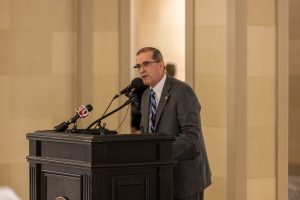
In making his latest challenge to an Oklahoma Corporation Commission decision granting a rate hike for Public Service Company of Oklahoma, Rep. Tom Gann says if the Supreme Court rules in his favor, it would mean the rate hike increase order was void along with others.
He called the circumstances in the case “extraordinary, as is their multi-billion-dollar impact on millions of Oklahoma utility customers.” Gann also said the errors of the Corporation Commission were “egregious.”
“To put a stop to them is good law, good public policy, and a necessary precedent for this Court to set. Void orders must be reversed, coverups must end, and the wrongs done to PSO’s customers must be remedied. This Court has the authority to precipitate this, and justice demands it,” said Gann in another court motion.
His contention came in his response to filings by the Corporation Commission and the Attorney General in which they defended the decisions.
“Where elected officials fail in their duties “of supervising, regulating and controlling” monopoly public utilities “and of correcting abuses and preventing unjust discrimination and extortion” (Art. IX, § 18), this Court must overturn them.”
Gann, R-Inola filed suit earlier in the year challenging the $250 million in rate increases and $1 billion in bond payments that are being collected from PSO customers. He contended the OCC failed to require a lawful audit of the costs before allowing PSO to issue nearly $700 million in ratepayer-backed bonds which ultimately cost its customers more than $1 billion. The legislator also maintained PSO’s bonds came in about $200 million more expensive than estimated by the OCC.

“”The legal issue in this case is simple: Is the OCC bound by Oklahoma law – including Ethics Rules and the Oklahoma Accountancy Act?” Appellant still says, “Yes.” The actions, and now the words, of the OCC, Attorney General (“AG”), PSO and Oklahoma Industrial Energy Consumers (“OIEC”) all assert, No,” stated Rep. Gann in the most recent Supreme Court filing.
The legislator added, “Simply put, if this Court finds that the OCC is required to comply with the Accountancy Act in its use and interpretation of the word “audit” with respect to financial matters, then all the challenged orders in 2021-76, 2022-93 and 2023-86 are void. If this Court finds OCC Commissioners are subject to Ethics Rule 4.7, even in legislative rate cases, then ratepayers’ due process rights were violated in 2023-86.”
Gann raised challenges that a one-page audit, approved by the Corporation Commission did not comply with state law and was inadequate. The legislator’s filing headlined the argument, “First Fundament Error in 2023-86–Failure to Properly Interpret Laws about Audits.”
He argued that an audit, “pursuant to 74 O.S. § 9078 was required to be performed as part of this 2023-86 general rate case for PSO” and that the testimony about the commission’s Public Utility Division audit was “false (due to noncompliance with the Accountancy Act).”
Further, Rep. Gann made the claim that “the Attorney General and OCC have Indirectly Admitted the OCC’s “Audit” Activities pursuant to the Securitization Act Did Not Comply with the
Accountancy Act; this Admission also Renders PUD’s “Audit” Testimony False.”
He believes the Attorney General was wrong in his arguments in defense of the action taken after a new state law allowed the use of bonds to cover utility fuel costs following the devastating 2021 Winter Storm Uri.
“By arguing that the audits required by the Securitization Act did not have to comply with the Accountancy Act, and that the OCC’s “audit” proceedings instead satisfied a far less demanding meaning17 “uniquely defined” in 74 O.S. § 9078, the AG and OCC have indirectly admitted that the OCC’s “audit” activity pursuant to the Securitization Act did not comply with the Accountancy Act.
Gann also maintained state law requires the participation of CPAs in the preparation of corporation commission audits in order to be admissible, yet there is no evidence in the record showing that licensed CPAs were involved with any of the audit activities.
Gann’s full Reply Brief can be read online here:
https://www.oscn.net/dockets/GetDocument.aspx?ct=appellate&bc=1063629140&cn=CU-122861&fmt=pdf

